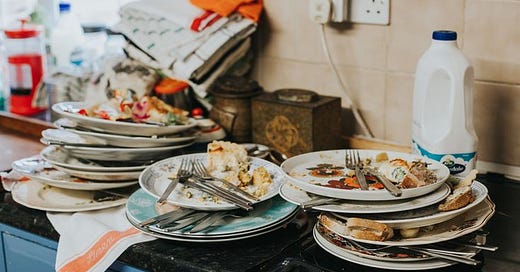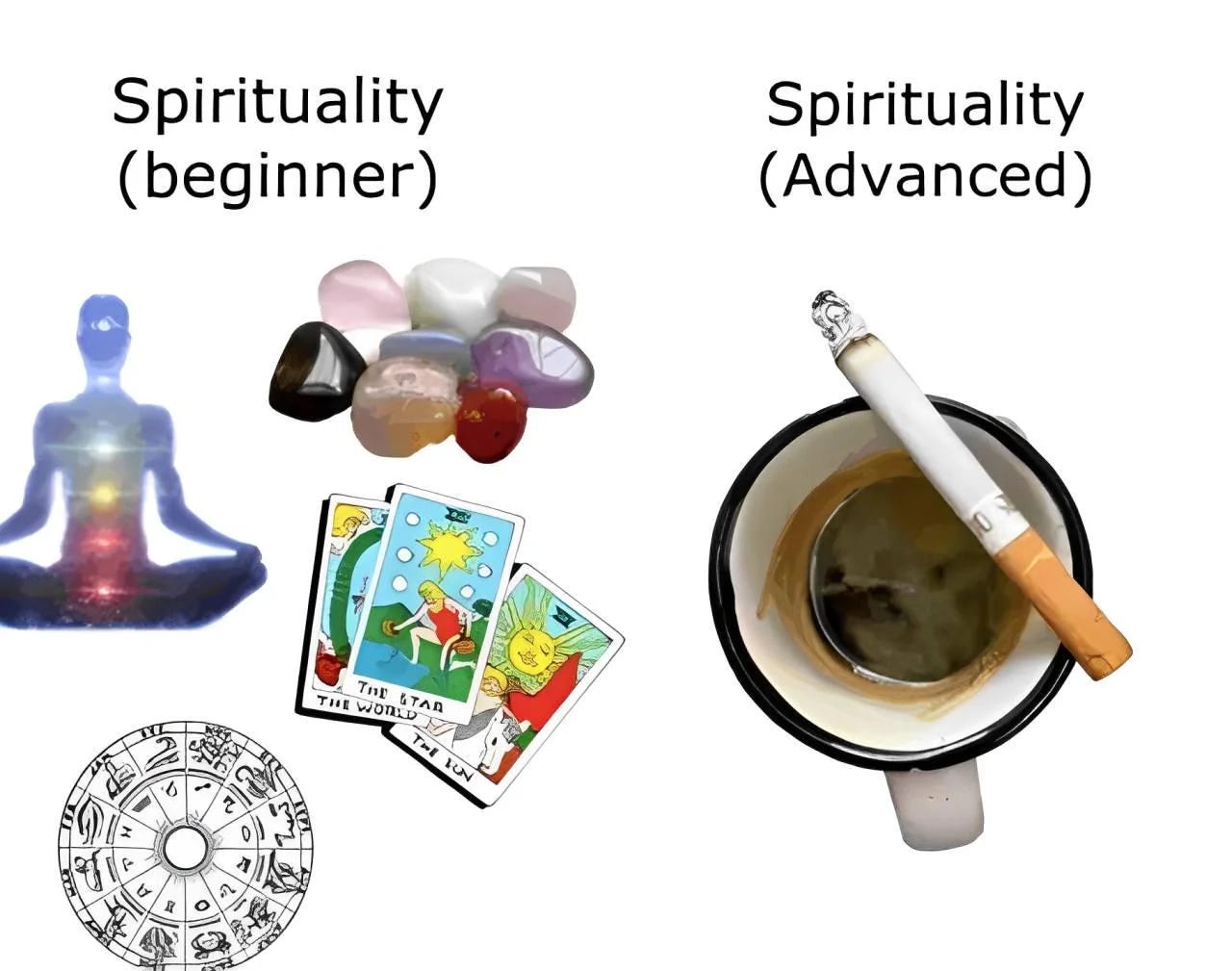“Would you be interested in coming?” My boss propositioned me as he told me about wanting to host a plant medicine retreat.
Would I? Be interested? In doing ayahuasca? As a work event?
The question caught me off guard.
I feel like I should want to. Past versions of me would be foaming at the mouth for the opportunity. But now? I was surprised that my answer wasn’t a resounding “yes”, but a hesitant “maybe”.
Ketamine, hold space, set boundaries, “do the work”, do you know your attachment style? Microdose, meditate, integrate, release stored trauma, radical acceptance, inner child work, raise your vibration, have you maybe tried a mold cleanse? Adaptogen coffee, shadow work, connect with your divine feminine, past-life regressions, are you going to the burn?
I’ve been in the health and wellness industry for most of my adult life. I’ve been both a victim and perpetrator of almost all of these things (my boss invited me to do ayahuasca, for cripe’s sake), and truthfully, I believe in a lot of them (to an extent).
But even to me, it’s all just becoming word soup—things I’d giggle at if I overheard them in the aisles at Erewhon.
“Of course”, I’d snicker to my husband, “could this be more on the nose?”
as I pick up my $16 raw coconut milk matcha latte and chocolate chaga brownie.
Sure, you know the right words to fit in with a certain demographic, but beyond that? What does any of it even mean?
Now is the time where I feel like I should preface this by saying: overall, I really enjoy the industry as a whole. For all of its misgivings, it’s transformed my life in ways beyond measure.
But the more mainstream “wellness” becomes, the more my antennas go up, weary of the commodification of the human condition.
Being in the wellness industry for so long, I’ve begun to notice what can only be described as the “fitness to spirituality pipeline”. I can’t tell you exactly why it happens, only that it does.
And last year, I found myself at the point along this pipeline where you start going to therapy.
Everyone who’s anyone goes, I felt like I should do it, and my boss offered to pay for it, so I tried it out.
I think that’s when the shift in my perception began and I started to see the little red flags.
Every other week, I spent an hour crying to a stranger over Zoom about how my life hadn’t panned out the way I thought I would. About how terrible my past boyfriends were, about the pressure my family put on me to be perfect, about how my first business got destroyed by someone I thought I could trust, and my career had been a dumpster fire ever since.
But after a while, instead of drastically improving my life and “healing my wounds” like everyone promised, it started to make me feel worse. I started focusing on everything I hated about myself and my life. I started to feel more fucked up—like my life was in more disrepair—than it did before I started.
Wtf was this?
This couldn’t be what everyone was raving about.
It took me a long time to figure out why therapy didn’t work out for me (PS not saying it won’t work for you, if you feel the call, please give it a shot!), but after a year or so since my last therapy session, I think I’ve figured it out:
Seeing the human condition as a pathology—one that must be snuffed out, polished, and made presentable to the world—didn’t sit well with me. I felt like every thought, feeling, and action I had was fundamentally wrong. That it could be—or should be—improved, optimized, and of course, outsourced to products and services that cost thousands, if not tens of thousands, of dollars.
Naturally.
This idea that we all need to “heal” implies that there’s some ideal, specific state that we’re trying to get to. But what that looks like? Nobody really knows. Except for the guy wearing a deep v-neck, linen pants, and a crystal on a chain around his neck (bonus points for a man-bun)—for $30,000, he can tell you.
In all seriousness, where does it end? Where are we trying to get to? At what point will I be healed enough? How much money do have have to spend, how much plant medicine do I have to do, until I’m sufficiently healed? Are we actually trying to get somewhere or are we just running away from the parts of ourselves deemed unacceptable, trying to wash them away, optimize them, and learn enough jargon so that no one finds out the truth:
that you’re a human being.
That you're not the first person in the history of humanity to not live a messy existence.
Who is bestowing unto us this notion that life is supposed to be bliss and that anything less than an easy, breezy life is cause to raise the alarm?
I reject this expectation.
I reject the incessant pathologizing of the negative aspects of the human experience. Maybe you’re not depressed, maybe you’re just…sad? IT’S OK TO BE SAD. IT’S A THING YOU’RE GOING TO FEEL AS A PERSON ON THIS EARTH, GUARANTEED.
Why would I want to heal from my human emotions? What a flat, dull, boring person I would be. What a dull, flat, boring experience.
Isn’t life supposed to be going from experience to experience, collecting wisdom, and evolving? Isn’t that literally what life is?
So why are we trying to expedite it?
Truthfully, the people I know who’ve sunk the most capital in “healing”? You couldn’t pay me to switch places with them. And they tend to become the same people that become “healers” (btw, a good rule of thumb: don’t trust anyone who calls themselves a “healer”—no one has the power to heal you but you). Under their white linen Ibiza costume runs a vibe I can’t shake—one of deep sadness, stuck circling the drain of trying to wipe everything from their past clean until… what’s left? Now that you’re perfect?
When we treat emotions like pathologies, we pave the way for exploitation. Now, normal states of being are problems that need to be eradicated. You need more therapy, more plant medicine, more retreats, more cleanses. Everything in your life becomes a diagnoses. But not all of our exes can be sociopaths, not all of our mothers can be have borderline, not everyone is a narcissist, and we’re not all anxiously attached and highly sensitive.
This tendency we’ve developed to want to categorize everything and put them into black-and-white boxes isn’t strange—as the DSM5 has made its way into pop psychology, it’s predictable that this information makes its way into our prefrontal cortex and becomes just another way the human brain needs to sort and categorize information to use our past experiences to make better predictions about the future.
But we’ve taken it too far and out of context.
It’s driving a wedge between us and causes us to take life far too seriously.
*The feminine urge to explain myself approaches*
Listen, this is not to excuse shitty people or “radical acceptance” as a form of laziness. And it’s certainly not a war cry for “you’re perfect just the way you are”—barf. I’ve microdosed psilocybin (and will again in the future), I meditate, do (and teach) breathwork, journal, love palo santo, and will likely do ayahuasca at some point. But not from an “I hope this will fix me” standpoint, but from a place of curiosity. My ultimate goal in life is to explore as many reaches of the human experience as possible, and plant medicine is certainly part of that.
I also understand that trauma does exist and can run its course through our lives infecting everything like a poison, and there are certain tools and practices that can help. I think it’s important to have awareness of yourself, how you relate to others, and the lessons you seem to never quite learn and work on them. Not to be perfect, but because collecting experience, and wisdom, and leaving things better than you found them is what the journey of life is about.
By attempting to erase our experiences, or, conversely, by giving them way too much gravity, we erase all of the juicy parts about being alive.







